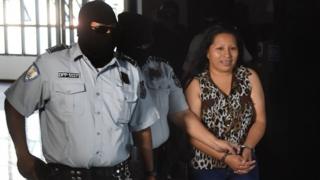El Salvador reviews controversial baby-murder case
Judges in El Salvador are due to decide whether to free a woman jailed for murder after her baby was found dead.
Teodora Vásquez has always maintained her innocence, saying that she called an ambulance when she had abdominal pains late in her pregnancy and then passed out.
By the time she regained consciousness her newborn was dead and she was surrounded by police, she says.
She was sentenced to 30 years in prison in 2008 for aggravated murder.
El Salvador is one of six countries in the world where abortions are completely banned and carry heavy sentences.
The punishment for abortion is up to eight years in jail but in many cases in which the foetus or newborn has died, the charge is changed to one of aggravated homicide, which carries a minimum sentence of 30 years.
Ms Vásquez's was one of those cases.
Read more:
- The mothers being criminalised in El Salvador
- Where women are jailed for miscarrying
- El Salvador teenager weeps in court at stillbirth jail term
Now her case is up for review and a judge is due to decide later on Wednesday whether she should be released or whether she should serve another 20 years in prison.
Human rights groups have expressed concern at the fact that it is being heard by the same judges who sentenced her in 2008.
While El Salvador is not alone in Latin America in having a total ban on abortions, the country is particularly strict in the way it enforces it.
Doctors have to inform the authorities if they think a woman has tried to end her pregnancy. If they fail to report such cases, they too could face long sentences in jail.
The result is what human rights groups are calling a criminalisation of miscarriages and medical emergencies, with more than 100 convicted of abortion-related crimes in El Salvador since 2000.
Ms Vásquez's family has been campaigning for her release with the help of pressure group Amnesty International.
Her relatives say Ms Vásquez, who was 24 when she became pregnant with her second child, had been looking forward to having the baby and had no intentions of having an abortion.
They say she has hardly had any chance to see her first child since she was jailed in 2008.

